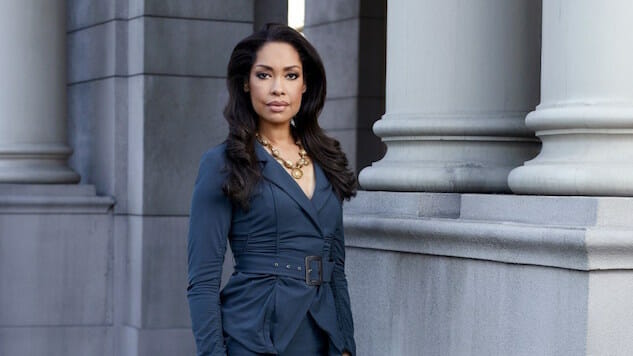Pearson: Come for Gina Torres, Then Decide Whether to Stay
This Suits spinoff is not beholden to its predecessor.
Photo Courtesy of USA
“I figured you didn’t need a title. You’re Jessica Pearson.”
Pearson knows that the only selling point really needed for the series is “Starring Gina Torres.” Hell, Suits—the show from which Pearson and Torres’ titular Jessica Pearson are spun off—knew that, even though she wasn’t the lead. In fact, that’s exactly why there’s a Jessica Pearson/Gina Torres spinoff in the first place. On Suits, it was always apparent that the show had a heavy-hitter in Gina Torres, but based on the nature of the beast—as the majority of the series featured the two leads hiding a major secret from her, their boss—she was often on the sidelines, with very little material for her to sink her teeth into. But hey, she wore the hell out of a suit, far better than anyone else on the cast. (Pearson knows that too, which makes it especially jarring—and on one specific occasion, that’s intentional—to see the titular character actually in casual wear.) As Suits went on (it’s now in its ninth and final season) it only became more egregious that her role wasn’t any bigger, while still understandable given the nature of the show. Thus, the plans for the spinoff came to be. (After she left the show during Season Six and her follow-up series ABC’s The Catch was canceled, that is.)
Originally titled Second City—a pun playing off Jessica’s move from New York to Chicago but also kind of suggesting a far more-lighthearted show than it is—Pearson follows Jessica as she starts a new chapter in her life with her live-in boyfriend Jeff Malone (played by D.B. Woodside since Suits Season Four) and her new career as the unofficial “right hand” to first-term Chicago Mayor Bobby Novak (Morgan Spector). (The more common term for this role would actually be “fixer,” but it’s one that Jessica hates, so the series goes through great pains to forgo a label altogether, most likely to curb any more Scandal comparisons than there already are.)
Pearson’s first couple of episodes clumsily dance around what led to this new dynamic, but it’s actually better explained in Suits’ Season Seven finale/Pearson’s backdoor pilot, “Good-Bye,” where Jessica’s Chicago law license is taken away. (During Suits Season Six, Jessica had already been disbarred in New York due to a different act of revenge.) Jessica’s final case as a lawyer (alongside her Suits protégé, Harvey Specter) is a class-action lawsuit against the city, regarding a public housing development that’s about to be destroyed by very corrupt real estate developer Pat McGann (Wayne Duvall). The twist? Jessica took the case to save her previously unseen and unknown extended family from ending up on the streets. As Jessica went further down the rabbit hole for this case, she quickly began to uncover the seediness at play, even ending up in the crosshairs of a Chicago cop who clearly served a much larger master, Nick D’Amato (Simon Kassianides).
As a way to get Jessica to drop the case and to stop going after both himself and McGann, Novak offered her a seat at the table, as the person who fixes his problems (of which there are many). This is not a relationship built on trust or mutual respect: For Novak, it’s purely out of survival and keeping Jessica’s nose out of his business with McGann, and for Jessica, it’s the old impossible trope of attempting to fix immense corruption from within. The icing on the political cake is when Jeff’s sources at the Department of Justice suggest that Novak (and the company he keeps) is the type of politician who has no problem disappearing people who get in his way, which could include the fearless-but-somewhat-in-over-her-head Jessica Pearson.
For fans of Suits, the change in tone that comes with Pearson will no doubt be jarring, but it offers a more substantial role for Torres in a more fleshed-out version of Jessica. (And yes, there are someSuits references and a couple of cameos, but it’s nothing major that affects the flow of the show or makes for a major crossover event.) For people who aren’t fans of Suits (or haven’t watched in years), it’s not necessary viewing for Pearson, which serves as a standalone vehicle on its own. And if you like Pearson, that doesn’t necessarily mean you’ll like Suits. Suits is a legal drama, Pearson is a political one. It’s not abnormal for a series’ spinoff to be more serious or mature, but hopefully, no one goes into Pearson expecting to find a sliver of that sense of humor that defined Suits, a series that did begin during USA Network’s Characters Welcome era, after all. (Although, if you do want some fun with your Pearson viewing—especially in the first half of the season—drink every time the show has a character say some variation of the classic line, “You’re not from around here,” to or about Jessica.)
-

-

-

-

-

-

-

-

-

-

-

-

-

-

-

-

-

-

-

-

-

-

-

-

-

-

-

-

-

-

-

-

-

-

-

-

-

-

-

-








































